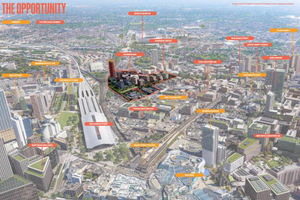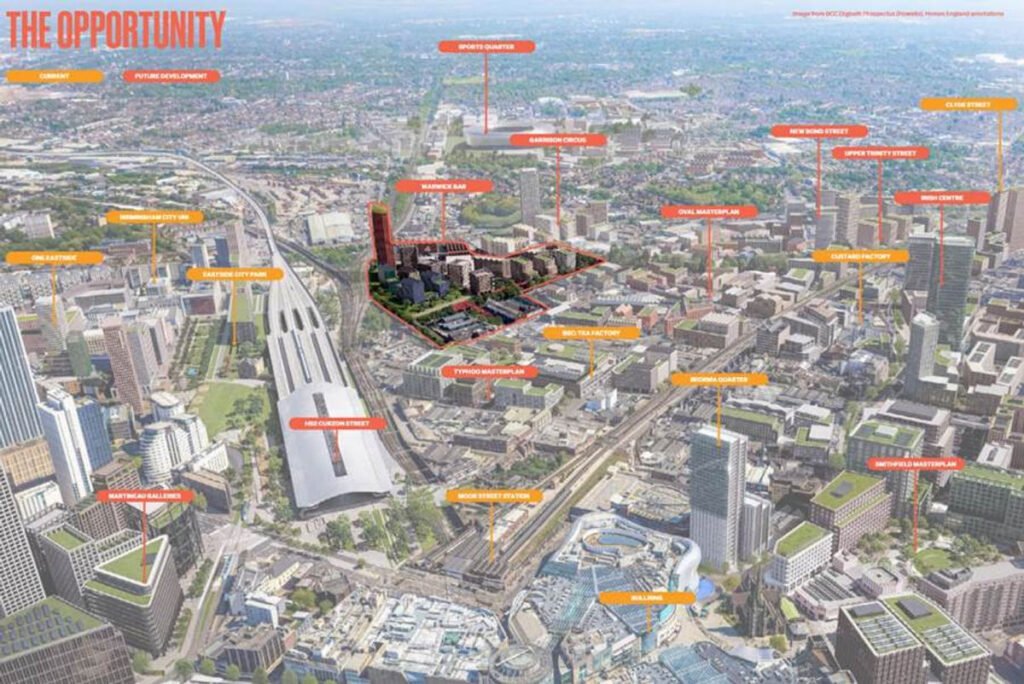Mayor Richard Parker said he was building on a wave of investment into the Birmingham neighbourhood from big entertainment industry names like the BBC, Netflix and Steven Knight – creator of Peaky Blinders and House of Guinness as he announced the next phase of the area’s renaissance.
During a visit to Steven Knight’s new Digbeth Loc. Studios, with Lisa Nandy, Secretary of State for Culture, Media and Sport, the Mayor announced two new projects.
The first – Warwick Bar Prospectus – sets out a vision for the regeneration of sites covering an area the size of 22 football pitches with the potential to deliver more than 1,700 new homes and upwards of 110,000sq ft of new creative workspaces.
Production Central WM was the second – a new film production office to connect producers with the set locations, local crew and suppliers needed to bring more big and small screen blockbusters to the region.
The new film production office is just one example of how the Government’s £25m Creative Places Growth Fund for the region can be used to drive new creative sector projects.

Richard Parker, Mayor of the West Midlands, said: “Digbeth will be bigger, better and bolder than Manchester’s Media City – it’s central location and abundance of investment opportunities make it unique. A place known for its grit and graft, it is at the cusp of its renaissance as a top location for the creative industries.
“The BBC and Steven Knight are just some of the partners who are investing heavily in Digbeth’s future, because they know that this place, at the heart of the country, has the backing of industry and government – and a wealth of local talent to work with. Together, we’ll write a new chapter in Digbeth’s history that puts our region centre stage for the creative industries.”
Culture Secretary Lisa Nandy said: “As an MP in Greater Manchester, I have witnessed up close the transformational impact that Media City has had on my region, both economically and culturally.
“That is why I am so excited about these plans for Digbeth. Birmingham and the West Midlands are full of untapped creative potential, and this development will enable more creatives from the region to tell their own stories, create world-class content and drive economic growth.
“For too long, our media and creative industries have been overly skewed towards London and the South East. That is why we are backing the West Midlands’ creative businesses with £25 million to enable them to thrive.”
Digbeth has been the focus of widespread regeneration and investment in recent years driven in part by the nearby HS2 Curzon Street Station site, the forthcoming Metro tram route and the thriving cluster of creative businesses at the Custard Factory.
Steven Knight’s new Digbeth Loc. Studios, located within the Warwick Bar site, will produce the next two series of Peaky Blinders and were used by Netflix for the movie version of the TV show.
In a message to international film and TV makers, Steven Knight added: “The West Midlands is old, new, green field, brown field, urban, rural, posh, poor, 16th century to 21st century, high rise, high end, low end, back to backs, chimney stacks and babbling brooks…most of which have never been shot.
“And it costs less than most other places. If you want to shoot here, we now have a brand new, super-fit for purpose film production office which matches the region’s ambitions. It’s called Production Central WM and whatever location you want we can find it within an hour’s drive of New Street station.”
Additionally, the BBC is converting the former derelict Tea Factory into its new broadcasting centre. The corporation signed a landmark agreement with the Mayor last month to further support creative growth in the region which will see spend on BBC network television production almost double from £24m to £40m a year by the end of 2027. BBC investments are also on track to generate £282m of economic benefit in the region by 2031.
Masterchef produced in Digbeth
Popular shows like MasterChef, Late Night Lycett, Silent Witness, Policing Paradise and Garden Rescue are also being produced in Digbeth and the neighbourhood boasts several creative hubs including the Banana Warehouse, Grand Union at Junction Works and The Bond.
The Warwick Bar Prospectus has been drawn up by the site’s owner, Homes England, in partnership with Birmingham City Council, West Midlands Combined Authority (WMCA) and West Midlands Growth Company (WMGC). Homes England aims to start marketing of Phase 1 in November. It is seen as the next stage of Digbeth’s renaissance – offering one of the most important development opportunities in Birmingham and the UK’s largest untapped regeneration site alongside the HS2 high speed train line.
It is also set to benefit from a new Mayoral Development Corporation that brings together planning powers, funding and delivery under one roof – speeding up project times by cutting red tape.
Pat Ritchie CBE, chairperson of Homes England, said: “Warwick Bar sits in a unique position, leveraging the connectivity of HS2, the proximity to a growing city centre, the creativity and heritage of Digbeth, and the skills in the Birmingham Knowledge Quarter.
“Working closely with Birmingham City Council, West Midlands Combined Authority and West Midlands Growth Company, we have developed the Warwick Bar Prospectus.
“The Prospectus sets out our ambitious shared vision for the regeneration of Warwick Bar, it presents an exciting opportunity to interested delivery partners, to be part of one of the most important development opportunities in Birmingham and the wider region, driving Digbeth’s ongoing transformation.”
The announcements came as key Government figures, international business people, developers and investors gathered in Birmingham for a Regional Investment Summit, co-hosted by Chancellor Rachel Reeves, the Mayor and Secretary of State for Business and Trade, Peter Kyle to provide the West Midlands and other regions with a chance to showcase to global investors their potential for growth, innovation and talent.
Supporting the creative industries is a key part of the Mayor’s West Midlands Growth Plan and Digbeth plays a big role in Birmingham City Council’s framework for city centre growth, the Our Future City Plan, which champions Digbeth as the city’s ‘Creative Quarter’.

